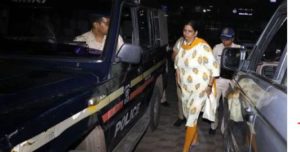
A day after the Supreme Court dismissed an appeal filed by the National Investigation Agency (NIA) challenging the Bombay high court’s order allowing default bail to Elgar Parishad case accused Sudha Bharadwaj, a special NIA court in Mumbai on Wednesday ordered the activist to be released on a cash bail of ₹ 50,000.
The Elgar Parishad meeting on 31 December, 2017 preceded widespread violence on January 1, 2018, and Bharadwaj and other activists were later arrested for allegedly inciting violence by creating communal disharmony while being hand in glove with the cadre of the outlawed Communist Party of India (Maoist). The Elgar Parishad meeting was meant to commemorate the 200th anniversary of the Bhima Koregaon battle, where a Dalit regiment of the British army is believed to have defeated the Marathas.
The case was taken over by NIA on January 24, 2020, following which 15 other activists were arrested in the case.
Bharadwaj was arrested on August 28, 2018.
On December 1, the Bombay high court allowed her default bail plea, accepting her claim that sessions judge K D Vadane, who granted the Pune Police a 90-day extension on November 26, 2018 to file the charge-sheet, did not have jurisdiction to do so as only the special NIA court could hear the cases of the accused booked under the Unlawful Activities (Prevention) Act (UAPA).
The high court had, however, asked Bharadwaj to appear before the special NIA court to get the bail conditions fixed. NIA appeal the HC decision before the apex court, which rejected it on Tuesday.
Bharadwaj on Wednesday appeared before the special NIA judge Dinesh Kothalikar, who ordered her release on a personal bond of ₹50,000 and one or two sureties in the like amount. The court also allowed her plea for furnishing a cash bond of ₹50,000 for three months, so as to enable her to arrange sureties.
The special court, however, rejected the 60-year-old activist’s plea to let her to stay in Chhattisgarh and Delhi where she works. Instead, the court restrained her from leaving the jurisdiction of the special NIA court in Mumbai and also ordered her to surrender her passport.
The court also restrained her from speaking to the media on the case, though her counsel advocate Yug Chaudhry opposed the condition on the ground of being ‘an infringement of her freedom of speech.’




 Driving Naari Programme launched in Chandigarh
Driving Naari Programme launched in Chandigarh






























